10 Under 10: Military dentist expands service modeled at home on a global scale
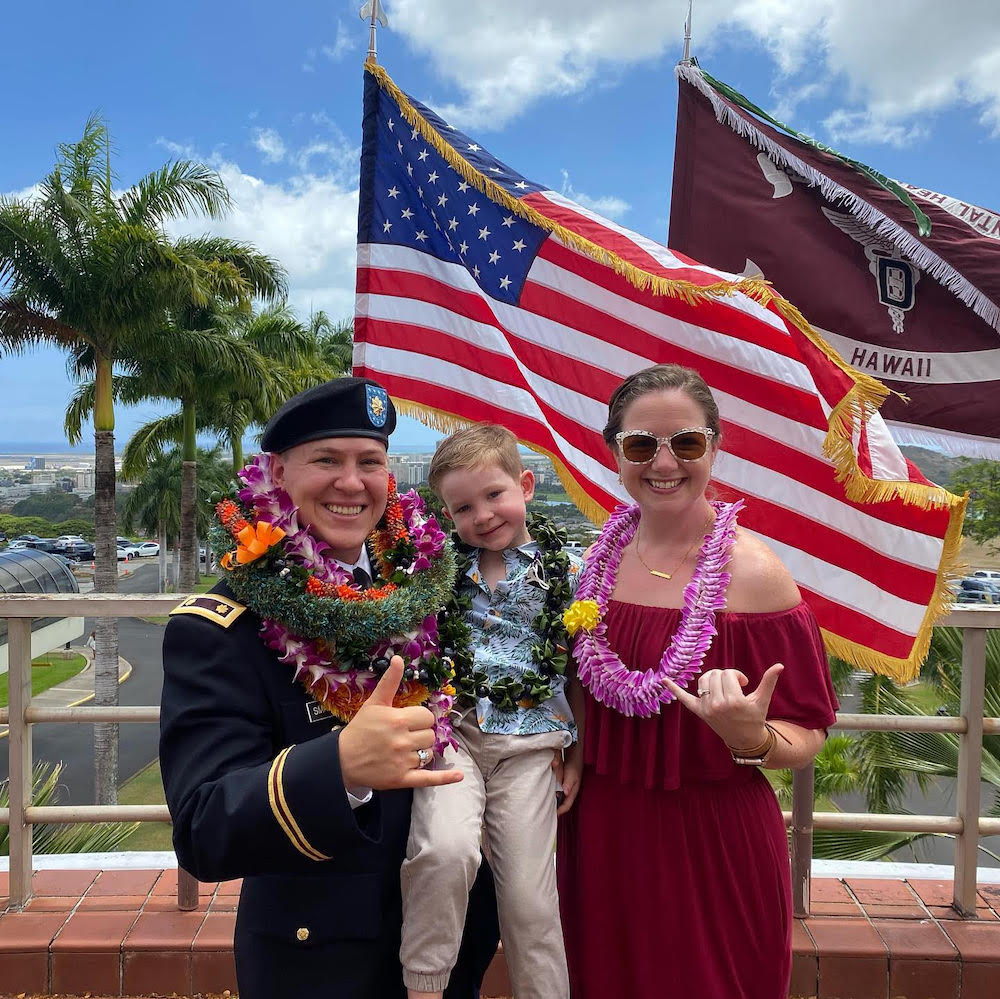
Growing up in Boonville, New York, U.S. Army Maj. Martin Smallidge, D.M.D., saw service and community engagement modeled by two leading figures: the local dentist and pharmacist. Witnessing those early models played a significant role in his dental career and contributed to his being recognized as an ADA 2024 10 Under 10 Award recipient.
“When I was in high school, thinking about a career in health care or science, I looked up to the dentist and pharmacist in my town,” Dr. Smallidge said. “They were more than their professions — they were servants to the community, they were at high school events, they participated in local boards and the pharmacist eventually became mayor of the town.”
Seeing these two professions model a “full experience” of both professional and community service resonated with Dr. Smallidge at a time when he was thinking about life and education beyond the town where he grew up.
When he entered the University at Buffalo for undergrad, Dr. Smallidge focused his medical field interest in biotechnology and research.
“The biotechnology curriculum allowed me to pursue my interests of becoming a biotechnology entrepreneur, a young man’s dream, while completing the required courses to apply to dental school, just in case,” he said.
During his first year at the University at Buffalo, Dr. Smallidge took a student researcher position in the department of oral biology, which was an “amazing opportunity to pursue both research and consider dentistry as a profession.”
He also volunteered at the University at Buffalo School of Dental Medicine. Volunteering at the dental school touched upon another early interest of Dr. Smallidge’s: hands-on work.
“My dad was an airplane mechanic and my mom’s family owned a marina, so I grew up working in the garage or at the shop,” he said. “Growing up, I worked a lot of small jobs to make cash, such as painting houses and mowing lawns. I worked in a hardware store for four years and managed the grounds at our county fairgrounds. I’ve always enjoyed that kind of hands-on work. Dentistry is problem-solving and hands-on work that other professions I considered just didn’t have.”
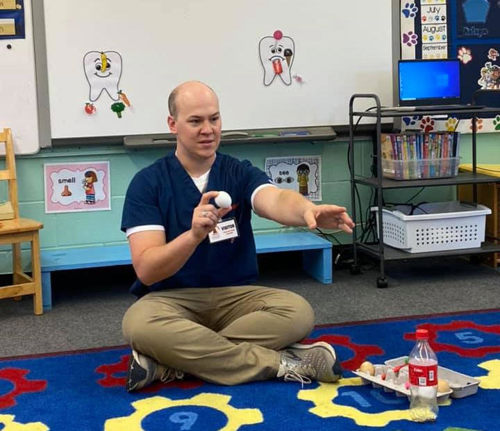
Then, at the end of his freshman year, Dr. Smallidge’s friend sat him down and gave him the clarity he was directly or indirectly looking for.
“He said, ‘No, man, this [volunteering at the dental school] is something you talk about enjoying. You should really continue to pursue that. I think that [dentistry] will be good for you.’ And that moment solidified my decision to pursue dentistry,” Dr. Smallidge said.
After that talk, he turned his full attention to dentistry, both in the community and in a research lab. He joined the University at Buffalo Pre-Dental Association — eventually becoming its president — and participated in research in the department of oral biology for three years. The combination of community and lab work matched his work style and allowed him to thrive and grow.
“It was constant problem-solving,” he said. “I really thrive in an environment where I am given autonomy to set my outcome and figure out a way to solve a problem.”
As undergrad was wrapping up, Dr. Smallidge faced a decision about financing his education. He had the opportunities to take a scholarship to pursue a Ph.D. and a dental degree on a civilian track or be commissioned into the U.S. Army.
He became interested in the U.S. armed forces near the end of high school, which coincided with the U.S. operations in Iraq and Afghanistan. His mother advised him to wait until after college to pursue a military career.
“The interest stuck with me. Service to the broader community was and has been a consistent theme always sitting in the back of my mind,” Dr. Smallidge said. “My mom said, ‘If you have the ability to go to college, go get the degree first. Then, if you’re still interested after, great.’”
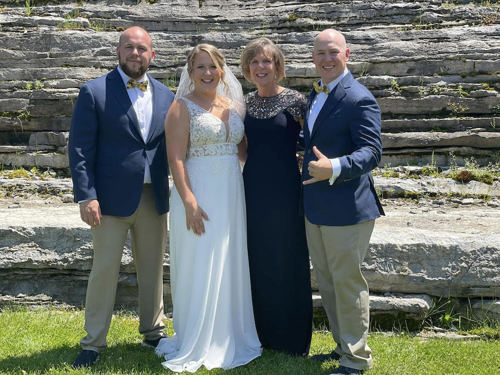
The right time to revisit the armed forces interest came in 2009, when Dr. Smallidge was applying to dental school. He had to decide if he wanted to pursue something “new and exciting and unknown” with the Army.
To help him decide, he took a step back to think about what he wanted his career as a dentist to look like, as well as consider other changes in his life. Dr. Smallidge turned to his future wife, Kate, to help in his decision. The scholarship would allow them to move anywhere in the country as he pursued his dental education. An Army career would cover his cost of dental school in exchange for a four-year service commitment and could take them on an adventure to anywhere in the world. Together they decided that Dr. Smallidge would accept the Health Professions Scholarship Program scholarship.
With the flexibility to attend any dental school through the scholarship program, Dr. Smallidge applied to 10 total and settled on the University of Pittsburgh, which allowed him to dual enroll in a Master of Public Health program and dental school for four years.
“I saw the public health degree as, ‘Yes, now I can go be a dentist, but I can get this degree that can start opening up my eyes and education [on] how to better society and improve health on a national and global level,’” he said.
Balancing both degree programs — dental school by day and public health by night — was a perfect fit for Dr. Smallidge.
“It was awesome; I loved it. During the day, I’m doing the intricate, hands-on work of dentistry, working with teeth and polishing them up, and then in the evening, you’re sitting down and having these academic discussions about society, health care improvement, quality of work, patient safety and public health at large,” he said.
While he enjoyed balancing two worlds and careers during his graduate degree and dental schoolwork, upon graduation it was time to fulfill his four-year Army service, which meant putting his master’s degree on the back burner and focusing on being a general dentist and providing clinical dentistry support for servicemen and women.
During his second year of service, Dr. Smallidge started a prosthodontics residency program with the support of the Army. Although that residency program didn’t add additional service time to his scholarship requirement, it also didn’t count toward the four-year commitment.
Dr. Smallidge said his interest in prosthodontics was simple.
“When I was in dental school, I just enjoyed being in the lab and doing the prosth stuff — the hands-on, focused problem-solving of making dentures, waxing teeth,” he said. “The technology and problem-solving there, I enjoyed it.”
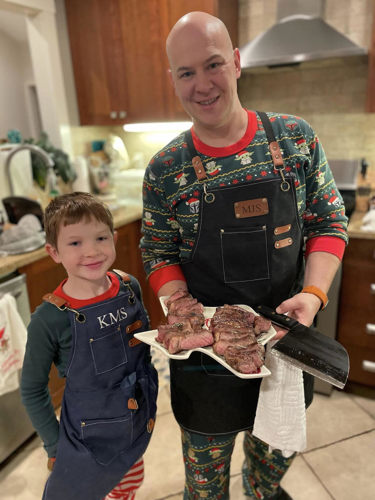
While there were no immediate opportunities for him to use his master’s degree with the Army, during his first year of service and late in dental school, Dr. Smallidge said he could tap into that degree by volunteering with organized dentistry at large with the American Dental Association New Dentist Committee and the American Student Dental Association.
Looking back at his prosthodontics residency, which involved seeing patients during the day and then working in the lab at night, Dr. Smallidge said, “Prosth residency in the Army is notoriously difficult, very long hours. We get trained to be superb lab techs on top of being prosthodontists because the Army requires us to be both trainers and leaders. Whether it’s fellow dentists or laboratory technicians, they want to know we have all the skills to act on our own because you could end up in a clinic where you’re the only person there who has more advanced training. We learn how to do everything top to bottom.”
Once his residency was complete, Dr. Smallidge and his family relocated to Honolulu to start a three-year program at Tripler Army Medical Center. But there was a decision looming on the horizon: leave the Army and pursue civilian job offers or stay in the Army, sign a new service contract and grow his dental and leadership career there.
Weighing the pros and cons, Dr. Smallidge and his wife jointly decided in February 2020 that he would stay in the Army and their family would continue to explore the travel and career opportunities within that organization, including being stationed overseas in Europe or Japan.
“We were happy and wanted to see where this would take us,” Dr. Smallidge said.
Newly re-signed with the U.S. Army to a six-year contract, he faced a huge challenge almost right away with the onset of the COVID-19 pandemic in March. Serving as the infection control officer for his dental clinics in Hawaii, Dr. Smallidge was on the front lines of balancing patient care, laboratory work and public health guidelines in the U.S. He described it as a day-to-day balance of how to help as many people as he could while also keeping his team and patients safe.
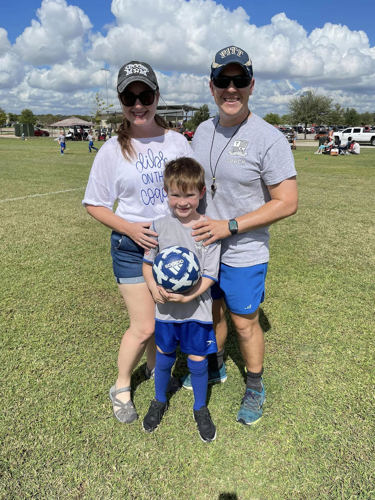
The pandemic and the public health challenges throughout that period did have a silver lining for Dr. Smallidge: He was able to draw upon his master’s degree to tackle some of the challenges and issues the medical center encountered while evaluating when to open the offices and laboratories.
He said he continues to see his master’s come into his Army assignments as his next phase of service and career unfolds.
“As you advance in rank to major, lieutenant colonel, colonel, the expectation is that you are doing something bigger within the organization,” Dr. Smallidge said. “You’re not just seeing the patients; you might become in charge of a clinic or other things. I wanted to do that. I wanted to use my M.P.H. more.”
Broadening his dental and public health experience while growing his career in the Army meant Dr. Smallidge and his family relocated to San Antonio for an executive fellow position at the U.S. Army Medical Command, which allowed him to develop programs and policy for the Army Health System. He and his family recently relocated to Belgium for a new assignment as the clinic commander for two dental clinics.
Long term, Dr. Smallidge sees his career progression as staying within the medical field but flexing his master’s degree, problem-solving and leadership skills to assignments outside of dentistry, too.
“I would like to continue to work through more complex, wicked problems as I progress in my career,” he said. “That’s what I’ve always enjoyed doing, and that’s what I hope to continue to do.”
Outside of his work in class, the clinic and laboratory, Dr. Smallidge enjoys doing hands-on projects around his house and in his garage. He also coached a soccer team for four seasons, and he is an active cook and foodie. With his family’s recent move to Belgium, a new world of gastronomic adventures are ahead.
Learn more about the 10 Under 10 Awards program at ADA.org/10Under10 and get inspired at SmileCon's Changemakers Celebration, which will recognize this year’s 10 Under 10 Award winners and other award recipients.



